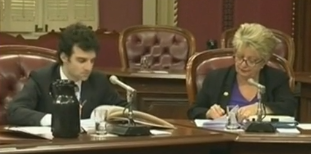Quebecers have stayed true to their tune of being fed up of sovereignty politics, but it appears the PQ are ready to unleash the "lobster trap" last spoke of 20 years ago by then-Premier Jacques Parizeau. He told European diplomats that if he could get Quebecers to say yes to the referendum, he would have them trapped "like lobsters in a pot of boiling water." It is no secret the strategy can be applied to attaining a PQ majority government - something Liberal leader Philippe Couillard pointed out earlier this week.
A PQ majority government, much like the Conservative majority government in Ottawa, would have a free pass on any legislation it wants. The Conservatives are extremely unpopular in Quebec, trailing the NDP and Liberals in terms of public support. As much as Quebecers may be in opposition to the omnibus bills the Conservatives have effortlessly passed in Ottawa, giving the PQ a majority presents Pauline Marois the same opportunities provincially. Quebecers who vote PQ for cultural values and don't want another referendum would be forced to accept another referendum. Quebecers who vote PQ for left-leaning economic policies would be forced to accept the Charter of Values, a topic that has been extremely divisive in this province across all partisan boundaries. A PQ majority, just like the Conservative majority in Ottawa, is a "lobster trap" and a trigger to pass unpopular legislation driven by ideology and emotion instead of facts and reason.
Given today's circumstances, the more the PQ speak of a referendum, the less popular they get. The PQ are counting on soft nationalists for the majority, and with 61% poised to vote "No" if one was held today, many voters would likely opt to dodge the referendum altogether. When Marois's star candidate Pierre Karl Peladeau announced he wanted to make Quebec a country, not only did he steal the spotlight from Marois, he drifted the carefully calculated PQ strategy off course - far enough that Marois pushed him aside at a news conference days later.
The PQ's train wreck of a campaign is a gift to the opposition Liberals who, polls suggest, are poised to make inroads in the Quebec city region because of the PQ's blunders. The campaign is far from over, but when polls suggest a shift of momentum giving the Liberals a 7 point lead over Marois, you know a lot can happen overnight in politics and until April 7, no outcome is guaranteed.
Not only are election results not guaranteed, many of Marois's sovereignty-related promises are not guaranteed. Marois can naively mislead Quebecers and tell them that separation is essentially everything we have now plus the title of "country" but if new briefing documents released from the White House say anything, it's that a sovereign Quebec won't have a guaranteed future on the world stage. It's bad enough that Marois pictures Quebec separation as a divorce where the ex continues giving her whatever she wants, it will be entertaining to see how Canada and the US respond to her bold promises based purely off hypothetical ideas.
As a sovereign country, Canada decides who uses the Canadian currency. If Canada rejects Quebec's use of the Canadian currency, then that's one promise broken. Quebec's debt-to-GDP ratio is the highest in Canada at 49%, just in front of Ontario's 37%. Add the responsibilities of becoming a country, and Quebec's credit reputation will take a hit. Economists believe that by 2022, if Quebec doesn't change its course, the debt-to-GDP ratio will exceed 57%. There's always the Euro to fall back to right?
As a sovereign country, Canada decides if there will be a Canada-Quebec border. It is in good faith that Marois says Quebec won't apply a border or tolls but the Canadian government can incur the costs and build a border anyway. If the Canadian government doesn't put tolls at Quebec entry routes, then the government can work out surcharges with the Quebec government. Marois says a Canada-Quebec border would remain open but that's one side of the deal and the Canadian government has the right to opt for a different set-up.
Marois dreams of establishing a European-like diplomatic setup between Canada and Quebec but unless Canadians are ready for this kind of setup, it appears unrealistic to even talk about. Oddly, being part of Canada already, many of these proposals are to diminish the impact of separation which wouldn't be necessary if Quebec accepted its role as a unique and distinct province in Canada - a role it already enjoys.
Quebec enjoys the benefits of being part of Canada. Canada's economic, diplomatic, and trade reputations have brought our country and its regional economies prosperity that Quebec couldn't simply have accomplished alone ranked lower than Canada on the world stage. About a quarter of Quebec's revenues, used to fund the OQLF, used to fund its own country-like bureaucracies, spent way beyond the means of this province's economic capacity is provided by the Canadian government through equalization - that's one benefit Quebec won't be getting in a partnership relationship as a country. Either Quebec will plunge into further debt spending (since there's still a sizable deficit) or at least 25% of Quebec's spending will have to be cut while Quebec requires new spending for a country's administration. Those dreaming of Quebec being an independent socio-democratic paradise have a better chance doing so in the constructs of Canada than they ever will independently.
However, even if the PQ do score independence, their plan is to draft a "white paper," something a party with independence as their raison-d'être should already have. The lack of this plan creates uncertainty which drives away investors necessary for beating heart of Quebec's economy.
In 1995, Quebec came close to separating. At the time, Liberal Prime Minister Jean Cretien in Ottawa and Democratic President Bill Clinton in Washington spoke of Canada's future. The White House was prepared to give two statements: one in the event of a "yes" victory, and one in the event of a "no" victory. Had the "yes" side won, the White House would have issued the following talking points drafted October 27, 1995, and released Friday by the Clinton Presidential Library. "Since the Canadians have yet to work out their future constitutional arrangements, it is premature to consider the question of recognition of Quebec."
The world's economies are deeply integrated today and Quebec benefits greatly from Canada's trade deals on the world stage. An independent Quebec wouldn't have guaranteed it would receive the benefits of being part of NAFTA. As we saw earlier, the US wasn't prepared to recognize Quebec as a country, let alone add a fourth "amigo" to the three amigos' pact. "Complicated legal issues are involved, and nothing is automatic," the note said. "We have given no assurances to any party."US Response to Quebec's 1995 Referendum
Note: it spells Jean Chretien's name wrong.
"IF NO: During the call, the two leaders discussed how important the vote was for the people of Quebec and Canada. Specifically, the President expressed his admiration for a strong and united Canada and how much the United States looks forward to working together with Canada to develop an even stronger relationship in the future," it says.
"IF YES: During the call, the two leaders discussed the outcome of the referendum and agreed that it is premature to predict the final impact of the vote. The President assured PM Cretien that the United States would continue to consult closely with Ottawa as Canada works outs out its constitutional arrangements in the coming weeks and months."
Marois was asked Friday about the revelations, and responded, "I will look at what you're referring to before making any comment and maybe I won't even make any comment." Ever since, she has worked to move the discussion away from independence.
Marois's train wreck of a campaign has given Liberal leader Philippe Couillard a chance to shine. Before, his strategy was to hammer away at the economy the whole campaign, now he can put the PQ on the defensive on their raison d'être. As Quebecers near April 7th, it is expected their minds will sway but one thing is clear: making sovereignty the ballot box question is a recipe for disaster for the pro-sovereignty party.
The campaign is between the Liberals and the PQ as the CAQ have lost relevance in a race that is so polarized and heated they are perceived as the deciding vote. It's a showdown between Marois and Couillard and the PQ would love nothing more than getting their coveted majority. This campaign has nothing to do with political stability, it has all to do with getting the PQ majority and avoiding the subpoena into the Charbonneau commission.
It would appear the PQ have a score to settle. When they lost the 1995 referendum, Parizeau blamed money and the "ethnic vote." The Marois government has been keen on taking money and "the ethnic vote" out of the picture by recruiting millionaire Pierre Karl Peladeau and introducing a Charter of Values that is a direct assault on ethnic diversity in Quebec. "Until next time," Parizeau said, and today we have Marois attempting to implement a "lobster trap" of her own. As soon as she has her majority, Bill 14, the Charter of Values and a Referendum will be on the table and there won't be an opposition to pull the plug. Perhaps the worst part is the PQ don't even have a feasible plan for Quebec independence and assumes matters as serious as foreign relations can be used as electoral bargaining chips. If you do believe Quebec should be a country, you're closer to finding a plan in the Option Nationale and Quebec Solidaire than you ever will be in the Parti Quebecois.
The PQ's train wreck of a campaign exposes much of what Marois calculatingly was trying to hide and while it presents great opportunity for her opponents to pounce the question is whether voters will listen. There is a long road to April 7 and with the help of young pequistes like Leo Bureau-Blouin and Maritine Desjardins, Marois will try to bury this week's events in the sand and keep her star candidate and to-be deputy Premier away from the mic.
Do you think the PQ have prepared another "lobster trap?" Share this article, join the discussion and let us know what you think: Facebook, Twitter, Google+











No comments:
Post a Comment